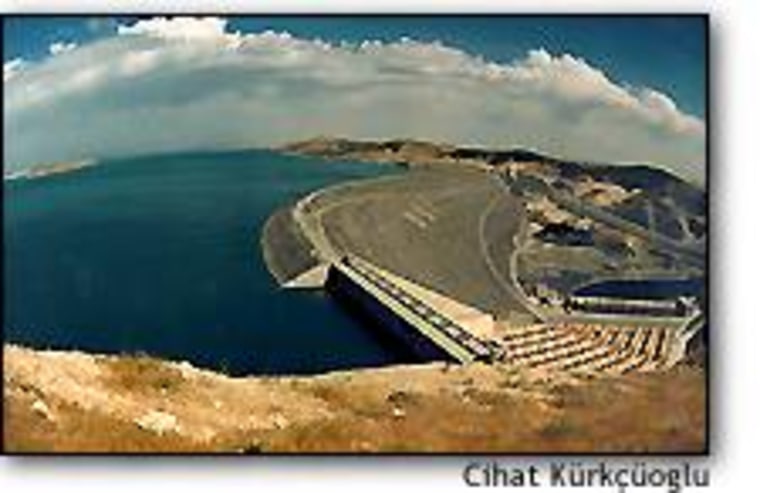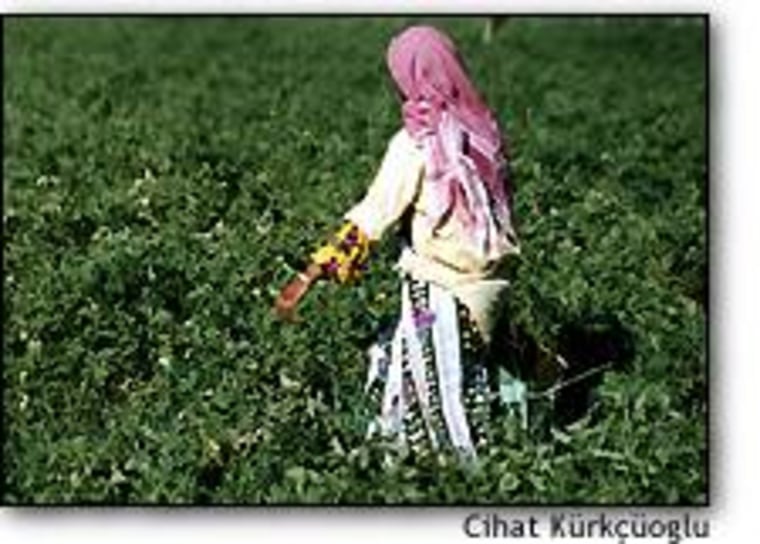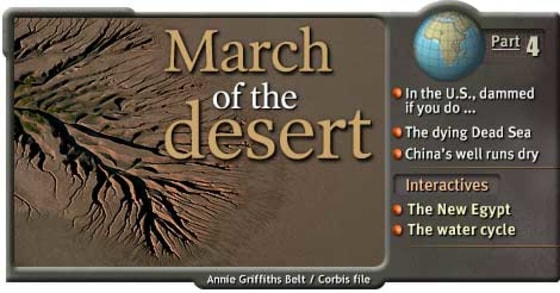In this landscape of arid soil baked hard by desert heat, the dark blue water snaking its way for miles up the winding Euphrates valley is a shock to the eye. For Turkey, this is the frontline of a $32 billion struggle to harness the waters of the Tigris and Euphrates rivers and fuel a boom in its under-populated, politically explosive southeast. But downstream in Syria and Iraq, this mammoth project is viewed with great foreboding.
The 554-foot high Ataturk dam is the center piece of Turkey’s ambitious Southern Anatolia or “GAP” project, a program that eventually foresees the construction of 22 dams. Like many other nations around the world, Turkey is using irrigation to expand the area of arable land and increase its agricultural output. An important byproduct, the Turks hope, will be increased development in an area torn by the Kurdish conflict for the past fifteen years. That makes hydroelectric power a key to Turkey’s future.
For Syria and Iraq, the soaring wall of the Ataturk dam is a potential nightmare. Officials in both countries worry that when the project is completed, the waters that define the “Fertile Crescent” will slow to a trickle. A decade ago, Syria was furious when Turkey turned off the taps for a few weeks to fill the lake behind the Ataturk dam.
In response, both Syria and Iraq let it be known that they regarded the flow of these great historic rivers to be sacrosanct. Iraq reportedly went so far as to threaten to bomb the dam if it were ever used as a means of pressuring the regime of Saddam Hussein.
Water wars?
International law provides few answers to settle disputes over the use of trans-national rivers. Some analysts believe that scarcity of water could eventually lead to conflicts. The issue plagues relations between states of the former Soviet Union. Mexico complains about American dams that have cut off the flow of the Colorado River into the Gulf of California.
The Nile, the Danube, the Yangtze, the Amazon, the Niger - all great rivers whose water rights are now contested.

The issue is particularly acute in the dry Middle East which is fed by only three major basins - the Tigris/Euphrates, the Nile and the Jordan river.
“Water, the scarcest natural resource of the region, effects relations between Middle Eastern countries even more than oil does. Indeed, so vital to the region is fresh water that the lack of adequate supplies has forced Middle Eastern leaders into strange and sometimes unwanted alliances and confrontations,” wrote Mostafa Dolatyar, of Newcastle University, in “The Middle East Environment.”
Turkey claims that Syrian and Iraqi concerns are misplaced.
“Turkey is committed to delivering at least 500 cubic meters of water per second, Syria will never suffer,” says Prof. Ali Ihsan Begis, director of the Hydropolitics and Strategic Research and Development Center at Hacettepe University in the Turkish capital, Ankara. “There is enough water in the basin for Turkey, Syria and Iraq. Regulating the water also means that countries downstream get a steady flow, whatever the season.”
Experts admit, however, that the quality of the water is likely to decline as pesticides and salt residues seep back into the rivers as a result of more intensive farming and development.
Turkish authorities remain unwilling to sign a formal treaty on the allocation of water, something that makes Damascus very uncomfortable.
A market for water?
International cooperation may well be the only solution if conflicts are to be avoided. Turkey’s late president Turgut Ozal came up in the late 1980s with the idea of a peace pipeline that would carry Turkey’s water to thirsty countries of the Middle East. But politics, and in particular the animosity between Arabs and Israelis, got in the way.

Turkey has now started exporting fresh water from the Manavgat river, on its south coast, to the Turkish enclave in Northern Cyprus, using giant plastic balloons towed by tugboats. During a recent trip, President Suleyman Demirel offered to sell water to Israel using similar techniques, and feasibility studies are under way.
To ensure a sustainable balance between man and nature, governments will have to wage their own wars at national level. In implementing their GAP program, the Turks cannot ignore their region’s history. It was indeed in the Tigris-Euphrates basin, further south in present day Iraq, that irrigation was first used some 6,000 years ago. The need to plan, share and control the distribution of water probably encouraged the development of the first organized civilizations, such as the Sumerians and the Babylonians, which thrived in the Fertile Crescent. But history also suggests that overuse of water which caused a buildup of silt and salt, and may have eventually brought the downfall of these early developed societies. The paradox is that while lack of water hinders agricultural production, excessive use can be just as damaging and reduce the land to desert through salinization.
The need to feed a growing global population, poor farming practices, deforestation and haphazard development have made these dangers more acute on the eve of the third millennium. Some 100 countries are affected today by the phenomenon described in the International Convention on Desertification, as “the degradation of the land in arid, semi-arid and sub-humid dry areas caused by climatic changes and human activities.”
The desert expands
Sub-Saharan Africa is the region most severely hit, but land and groundwater resources are being depleted all over the world. One third of the earth’s surface now suffers from this process, which seriously reduces agricultural yields and therefore threatens the livelihood of millions, and every year an additional 80,000 square miles is rendered unusable.
Even water-rich Turkey is not immune. “Erosion affects 78 percent of Turkey’s total land area,” says Dr Gülay Yasin, deputy director of TEMA, a foundation dedicated to combating the degradation of the soil. Steep slopes, high winds and hot climate account for part of the problem, but deforestation and overgrazing are the main culprits. Without roots to hold it in place, the soil is just blown away. Large sums are then spent on fertilizers to replace the rich nutrients that were lost. “The main problem is poverty,” explains Ms Yasin. “Peasants cut trees because they need money and they don’t have another fuel. No law can be successful in such circumstances. We can only combat erosion if we give alternatives.”
When nature suffers, consequences are widespread. Soil erosion for instance can in turn affect the dams. TEMA is now cooperating with the GAP administration to plant a barrier of forest around the lakes. “Some dams in Turkey, which were meant to have a life span of hundreds of years, got filled up by silt to the point of becoming unproductive in 40 or 50 years,” explains Dr. Yasin.
Through the longest irrigation tunnels in the world, measuring 16.4 miles in length and 25 feet in diameter, precious water is now brought to the parched Harran plains, south of the Turkish city of Sanliurfa, and farmers are switching from dry crops such a pistachio nuts or wheat to more profitable ones like cotton and fruit trees.
“It started as a water development project, but there has been a gradual shift of emphasis,” says Olcay Unver, the director of the GAP Regional Development Administration.
Retraining farmers
To ensure the success of its ambitious enterprise and avoid some of the environmental pitfalls, the Turkish government realized early on that an all-encompassing approach was needed. Training centers now teach farmers to save water through techniques such as drip irrigation while state nurseries experiment with crops to find the most suitable for the climate and conditions. Management of the irrigation programs has been placed in the hands of farmers’ association.
But old habits die hard. “Farmers are reluctant to change their ways,” admits Dilek Ozer, an enthusiastic young agricultural engineer involved in the program. In this part of Turkey where the population is a mix of Kurds, Arabs and Turks, and elsewhere in the world where education standards remain low, only proof that better income can result from change will convince farmers to adopt new methods. The GAP master plan, for instance, foresaw a rotation of 2 or 3 crops, of which only 35 percent was meant to be cotton. Yet, last year, most farmers opted for cotton, which sells well and can be easily stored. Monoculture, however, leaves the region vulnerable to crop diseases, and the large amount of water needed to grow cotton increases the risk of salinization.
The feud over water rights between Turkey and its southern neighbors may never ignite into a full blown regional crisis. But poor planning and insufficient management of the scarce water resources could do more lasting damage. Even the Middle East can exist without oil. But water is more than a commodity; it’s a necessity.
Nicole Pope is based in Istanbul and covers Turkey for MSNBC.
